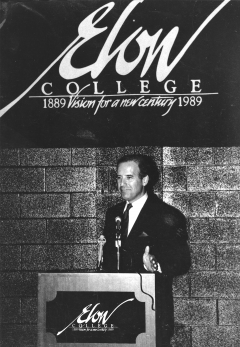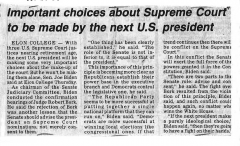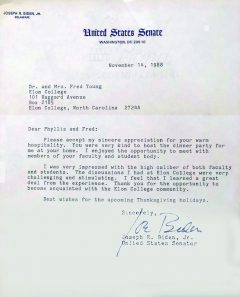The year was 1988 and the crowd was small, but the future president said the discussions were ‘challenging and stimulating.’

The small crowd of students, faculty and staff that gathered in Elon’s new McCrary Theatre on Oct. 27, 1988, could not have foreseen Joe Biden’s 32-year journey to being elected President of the United States. A year earlier, the U.S. Senator from Delaware had abandoned his first run for the presidency after admitting he had exaggerated his academic record and plagiarized portions of his speeches. Then in February 1988, he suffered a near-fatal brain aneurysm and spent seven months away from the Senate recuperating.
About a month after returning to work, the 45-year-old senator was back engaged in politics, making a campaign stop in Greensboro, North Carolina, to support Democratic congressional candidate Tom Gilmore before traveling to the Elon campus to give an address on foreign policy. Newspaper accounts of the evening event estimated the audience at about 50-100 people. Elon’s student newspaper, The Pendulum, reported Biden held a news conference “to a near-empty audience.” The community’s attention was clearly elsewhere during the final days of the 1988 presidential race between Republican George H.W. Bush and Democrat Michael Dukakis.

Despite the small crowd, Elon President Emeritus J. Fred Young remembers Biden as pleasant and comfortable conversing with a group of students and faculty who had dinner with him at the president’s home. Then, after the evening speech and a question-and-answer session with the audience, Biden lingered for about an hour in the theater, talking with Young and his wife, Phyllis. “He had the distinctive ability possessed by many successful political leaders to make everyone feel as if they had been acquainted for a lifetime and that they would be friends forever,” Young recalls.

While news stories report that Biden criticized the lack of substantive debate on critical international issues during the presidential campaign, he also reflected on his personal trials in what he called “an interesting year.” He said doctors told him he probably would have died from the aneurysm if he hadn’t dropped out of the presidential race, and he called his campaign “a presidential debacle.”
“I should have been a lot more mature when I ran for president,” Biden said at the time. “Hopefully I came out just a little bit wiser and a little more mature. Most important, it gave me confidence. I was proud of the way I conducted myself.”
President Young is happy he held onto the note of appreciation he received from Biden a couple of weeks later. “I’ll get that letter framed,” Young says.
“I was very impressed with the high caliber of both faculty and students,” Biden wrote in the letter. “The discussions I had at Elon College were very challenging and stimulating. I feel that I have learned a great deal from the experience. Thank you for the opportunity to become acquainted with the Elon College community.”
Presidential visits
Seven U.S. presidents have visited the Elon campus since its founding in 1889.
- Theodore Roosevelt (1904): Stopped at the Town of Elon railroad depot for a campaign speech
- Lyndon Johnson (1962): Spoke at Elon’s Founders Day convocation and received an honorary doctorate
- Gerald Ford (1966): Gave a Liberal Arts Forum address; (1986): Gave a Cultural Programs address
- Jimmy Carter (1976): Made a campaign fundraiser stop and had dinner with local Democrats on campus; (1989): Gave the keynote address during Elon’s Centennial Convocation
- Joe Biden (1988): Gave a public address in McCrary Theatre
- George H.W. Bush (2001): Spoke at Elon’s Convocation for Honors
- Bill Clinton (1992): Made a campaign stop in front of Alamance Building; (2008): Made a campaign stop for his wife, Hillary Clinton, in front of Alamance Building; (2016): Made a campaign stop for Hillary Clinton at Elon University School of Law in Greensboro


